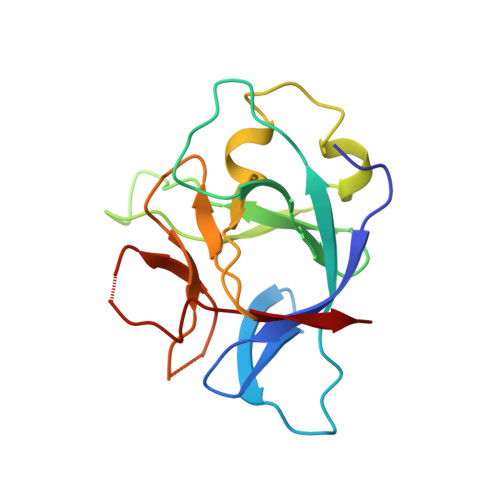Interleukin-37 monomer is the active form for reducing innate immunity.
Eisenmesser, E.Z., Gottschlich, A., Redzic, J.S., Paukovich, N., Nix, J.C., Azam, T., Zhang, L., Zhao, R., Kieft, J.S., The, E., Meng, X., Dinarello, C.A.(2019) Proc Natl Acad Sci U S A 116: 5514-5522
- PubMed: 30819901
- DOI: https://doi.org/10.1073/pnas.1819672116
- Primary Citation of Related Structures:
6NCU - PubMed Abstract:
Interleukin-37 (IL-37), a member of the IL-1 family of cytokines, is a fundamental suppressor of innate and acquired immunities. Here, we used an integrative approach that combines biophysical, biochemical, and biological studies to elucidate the unique characteristics of IL-37. Our studies reveal that single amino acid mutations at the IL-37 dimer interface that result in the stable formation of IL-37 monomers also remain monomeric at high micromolar concentrations and that these monomeric IL-37 forms comprise higher antiinflammatory activities than native IL-37 on multiple cell types. We find that, because native IL-37 forms dimers with nanomolar affinity, higher IL-37 only weakly suppresses downstream markers of inflammation whereas lower concentrations are more effective. We further show that IL-37 is a heparin binding protein that modulates this self-association and that the IL-37 dimers must block the activity of the IL-37 monomer. Specifically, native IL-37 at 2.5 nM reduces lipopolysaccharide (LPS)-induced vascular cell adhesion molecule (VCAM) protein levels by ∼50%, whereas the monomeric D73K mutant reduced VCAM by 90% at the same concentration. Compared with other members of the IL-1 family, both the N and the C termini of IL-37 are extended, and we show they are disordered in the context of the free protein. Furthermore, the presence of, at least, one of these extended termini is required for IL-37 suppressive activity. Based on these structural and biological studies, we present a model of IL-37 interactions that accounts for its mechanism in suppressing innate inflammation.
- Department of Biochemistry and Molecular Genetics, University of Colorado Denver, Aurora, CO 80238; Elan.Eisenmesser@ucdenver.edu cdinare333@aol.com.
Organizational Affiliation:
















